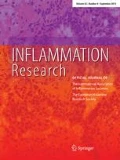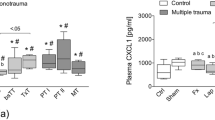Abstract
Objective
A common consequence in patients with blunt trauma is a deterioration of the immune system. The specific impacts of a frequently occurring isolated soft tissue trauma on the immune response are described. However, the dimension of trauma needed to cause systemic effects has not been definitely elucidated.
Methods
Mice were traumatized on the lower leg. The extent of soft tissue trauma was quantified by determination of the wet/dry ratio, magnetic resonance imaging (MRI), and serum content of muscle proteins. Five minutes, 3, 24, 36, 48, and 72 h after trauma (a.t.) the ex vivo cytokine-expression of immune-competent cells were measured.
Results
Trauma resulted in an early edema that could be quantified by MRI and wet/dry ration. Release of muscle-specific proteins was detected 5 min a.t. The trauma did not cause significant changes of TNF-α response of isolated cells to endotoxin. IL6-response of splenocytes to endotoxin was slightly increased 72 h a.t., while IL6-response of peritoneal macrophages to endotoxin was decreased 36 h a.t.
Conclusion
We describe a standardized trauma model for minor soft tissue injury in mice. Systemic effects on the immune system by traumatized lower leg were not found on the level of circulating cytokines or cellular responses to endotoxin.




Similar content being viewed by others
References
Chaudry IH, Ayala A, Ertel W, Stephan RN. Hemorrhage and resuscitation. Am J Physiol. 1990;259:R663–78.
American College of chest physicians/society of critical care medicine consensus conference: definitions for sepsis and organ failure and guidelines for the use of innovative therapies in sepsis. Crit Care Med 1992; 20: 864–75.
Chan RK, Ibrahim SI, Verna N, Carroll M, Moore FD Jr, Hechtman HB. Ischemia–reperfusion is an event triggered by immune complexes and complement. Br J Surg. 2003;90:1470–8.
Pinault GC, Sanson AJ, Malangoni MA. Inhibition of xanthine oxidase does not influence immunosuppression after hemorrhagic shock. J Trauma. 1997;43:911–5.
Malinoski DJ, Slater MS, Mullins RJ. Crush injury and rhabdomyolysis. Crit Care Clin. 2004;20:171–92.
Crisco J, Hentel K, Jackson WO, Goehner K, Jokl P. Maximal contraction essens impact response in a muscle contusion model. J Biomech. 1996;29:1291–6.
Kobbe P, Vodovotz Y, Kaczorowski DJ, Billiar TR, Pape HC. The role of fracture-associated soft tissue injury in the induction of systemic inflammation and remote organ dysfunction after bilateral femur fracture. J Orthop Trauma. 2008;22:385–90.
Zellweger R, Ayala A, DeMaso CM, Chaudry IH. Trauma-hemorrhage causes prolonged depression in cellular immunity. Shock. 1995;4:149–53.
Zellweger R, Ayala A, Zhu XL, Morrison MH, Chaudry IH. Effect of surgical trauma on splenocyte and peritoneal macrophage immune function. J Trauma. 1995;39:645–50.
Oberbeck R, Schmitz D, Wilsenack K, Schüler M, Biskup C, Schedlowski M, et al. Prolactin modulates survival and cellular immune functions in septic mice. J Surg Res. 2003;113:248–56.
Knoferl MW, Liener UC, Perl M, Brückner UB, Kinzl L, Gebhard F. Blunt chest trauma induces delayed splenic immunosuppression. Shock. 2004;22:51–6.
Ertel W, Morrison MH, Meldrum DR, Ayala A, Chaudry IH. Ibuprofen restores cellular immunity and decreases susceptibility to sepsis following hemorrhage. J Surg Res. 1992;53:55–61.
Walz CR, Zedler S, Schneider CP, Mayr S, Loehe F, Bruns CJ, et al. Depressed T cell-derived IFNγ following trauma-hemorrhage: a potential mechanism for diminished APC responses. Langenbecks Arch Surg. 2007;392:339–43.
Kawasaki T, Fujimi S, Lederer JA, Hubbard WJ, Choudhry MA, Schwacha MG, et al. Trauma-hemorrhage induces depressed splenic dendritic cell functions in mice. J Immunol. 2006;177:4514–20.
Choudhry MA, Bland KI, Chaudry IH. Trauma and immune response-effect of gender differences. Injury. 2007;38:1382–91.
Meert KL, Ofenstein JP, Sarnaik AP. Altered T cell cytokine production following mechanical trauma. Ann Clin Lab Sci. 1998;28:283–8.
Kobbe P, Kaczorowski DJ, Vodovotz Y, Tzioupis CH, Mollen KP, Billiar TR, et al. Local exposure of bone components to injured soft tissue induces Toll-like-receptor-4 dependent systemic inflammation with acute lung injury. Shock. 2008;30:686–91.
Brunn GJ, Bungum MK, Johnson GB, Platt JL. Conditional signaling by Toll-like receptor 4. FASEB J. 2005;19:872–4.
Flohé SB, Brüggemann J, Lendemans S. Human heat shock protein 60 induces maturation of dendritic cells versus a Th1-promoting phenotype. J Immunol. 2003;170:2340–8.
Ferrari D, Gorini S, Callegari G, la Sala A. Shaping immune responses through the activation of dendritic cells’ P2 receptors. Purinergic Signal. 2006;3:99–107.
Author information
Authors and Affiliations
Corresponding author
Additional information
Responsible Editor: M. Parnham.
Rights and permissions
About this article
Cite this article
Schmitz, D., Bangen, J.M., Herborn, C.U. et al. Isolated closed minor-muscle injury of the lower leg did not cause an obvious systemic immune response. Inflamm. Res. 59, 141–149 (2010). https://doi.org/10.1007/s00011-009-0081-z
Received:
Revised:
Accepted:
Published:
Issue Date:
DOI: https://doi.org/10.1007/s00011-009-0081-z




